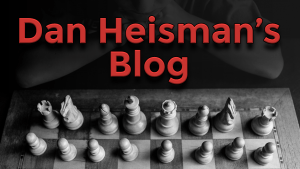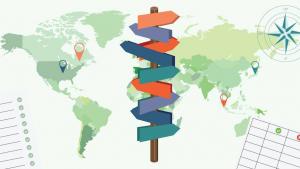Q&A with Coach Heisman Oct 26, 2012
Of special interest today was a brief guest appearance from my son Delen, now 29 and recently moved back to our Philadelphia area. Delen holds an interesting key to the ever-present topic of "How do I improve?" since his highest USCF rating was over 1800 yet, when asked how many chess books he read in his life, his answer was a swift "Zero!"
Of course, this reply immediately got many on the TV show's chat channel to exclaim "No wonder! He's got a father who is a master." True, but the truth is also that Delen was never interested in taking lessons from me, nor even having me review many of his games. The closest he came was to join his friends in an occasional group lesson once he got into high school. When asked about why he did not take advantage of what others perceived as a golden opportunity, Delen replied "Kids don't want to learn stuff from their fathers!"
So how did Delen get to be in the top ~10% (at least for peak rating) of tournament chess players by age 16 without reading a chess book or taking lessons? Here's the short list; he:
- Played in many OTB USCF tournaments each year, often ones with two-hour time limits
- He avoided strategic battles, preferring for relatively simple positions where he could use his basic tactical prowess
- He used his time wisely, neither playing too fast or too slow
- He was very good with basic tactics. When he was near his peak (11th grade), he rarely allowed simple tactics nor let ones his opponent allowed go unpunished (but he did admit that when he was younger and less interested in avoiding the same mistakes, he got back-rank mated no less than 10-15 times!
 )
) - He reviewed his games with his opponents and friends (while usually avoiding Dad)
I showed a checkmate that Delen had allowed while he was still a less-interested 1000 player (Delen was, unfortunately, Black):
Needless to say, allowing simple mates like this when you are otherwise winning easily is not necessarily the path to greatness. However, Delen did eventually come to care about his results a little more, especially when representing his school in team events, where he wasn't playing just for himself and his friends were counting on him. He favorite (as it is to many) was the US Amateur Team East (USATE) Championship, held annually over President's Day weekend in Parsippany, NJ. If you live in the Northeast US and have never played in this huge and amazing event, grab some friends and go!
I am always on the lookout for questions that don't involve improvement - these provide some variety for the show. One such question in today's show was whether I thought that possibly Morphy or Capablanca was the best player of all time. I answered that I saw a study where they gave all the World Champions' moves to a very strong computer like Rybka or Houdini and Capablanca's moves showed the smallest variance from the computer's.
However, there's a catch: Capa played a lot of "simple" positions where his second best moves might be rated +0.26 pawns whereas the computer's best move might be rated +0.32 pawns. But sharper players, like Tal and Kasparov or even Fischer, played more dynamic positions where there might be a much bigger difference between the move they played and the computer's best. So players who played "calmly" tended to be ones with the best score using this criteria.
Another criteria that can be used for "best ever" is FIDE ratings. But there has been some inflation over the years. In 1972, when Spassky defended his World Championship against Fischer, Spassky's rating was 2690, which would not even put him in the Top 40 today (Fischer's was 2760 before the event and I believe a then-record 2780 afterwards). So it was inevitable that, due to this rating inflation, Kasparov (or someone) would break Fischer's record, just as it is likely that Magnus Carlsen (or someone) will break Kasparov's. So absolute rating is not necessarily the best method, either.
The bottom line on the "who is best?" question is subjectivity: my money is on Kasparov and Fischer as the two best players of all time. A nod goes to Kasparov on tiebreak since he maintained that peak level through many more tournaments and games than Fischer did.
As always, the show delved into the question of improvement via reading books. I have a good, basic blog on that (and lots of Novice Nook articles, too). My Chess.com blog, Improving Requires Extensive Practice Looking for Better Moves, can be found at http://blog.chess.com/danheisman/improving-requires-picking-superior-moves-not-reading-books.
Finally, I also put in another plug for the Dan Heisman Learning Center (http://www.chess.com/groups/home/dan-heisman-learning-center), a group here at Chess.com. At "DHLC", as it is called, we have quite a few longer (e.g. 45 45) events, and I thank Mongoose Press, the publisher of my upcoming book The World's Most Instructive Amateur Game Book, for donating a few free books as prizes, and the Admins, who work hard to run the events, where we also give out a few free lessons as prizes.
Hope you can join the show on chess.com TV every-other Friday from 5-6:30 PM ET. Every other show (like this one) is open to all Chess.com. The other shows are for diamond and platinum members only. Thanks to all that join us for the show and cya then!
 )
)





